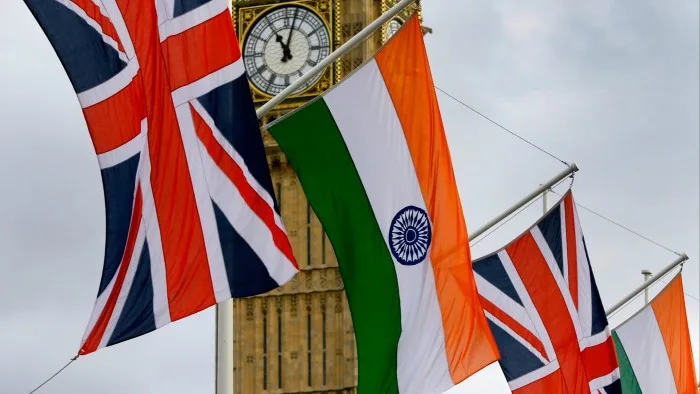Unlock the Editor’s Digest for free
Roula Khalaf, Editor of the FT, selects her favourite stories in this weekly newsletter.
Britain and India on Tuesday announced a “landmark” trade deal that included concessions to New Delhi on access to UK employment markets in return for big cuts to Indian tariffs on exports of whisky and cars.
The deal will exempt the UK operations of Indian employers from paying national insurance on Indian staff relocating to the UK for up to three years, making it cheaper to move people to Britain than previously.
The UK’s Labour government hailed the deal as a “bright shining light” at a time when US President Donald Trump’s tariffs have roiled the world economy.
But it faced domestic criticism over the national insurance move, just days after the anti-immigration Reform UK party swept local elections in England.
Reform leader Nigel Farage claimed that UK Prime Minister Sir Keir Starmer had “betrayed working Britain”.
India pushed hard during the three-year long negotiations for the “Double Contribution Convention”, which will give Indian employers in the UK relief from Britain’s 15 per cent national insurance levy paid by companies. The deal to avoid double taxation also covers national insurance contributions paid by employees.
New Delhi has agreed to cut whisky and gin tariffs, which will be halved from 150 per cent to 75 per cent before falling to 40 per cent by the tenth year of the deal. Car tariffs will fall from more than 100 per cent to 10 per cent, subject to a quota.
Talks on the deal accelerated in the wake of Trump’s imposition of global tariffs last month, with London and New Delhi keen to seal closer trade ties.
Indian Prime Minister Narendra Modi posted on X that the deal was “ambitious and mutually beneficial”, adding that Starmer would visit India soon.
British ministers hope the India trade deal could be a prelude to the signing of an agreement with Trump in the coming days, ahead of a deal with the EU to start improving bilateral trade links at a summit on May 19.
The UK government estimates the India deal will boost Britain’s economy by 0.1 per cent by 2040. Officials insisted it would not involve changes to the British visa system or broader immigration strategy, at a time when Reform and the Conservatives are campaigning hard on the issue.
British officials said Indian employees relocating to the UK would still be subject to salary thresholds for visas and have to pay the NHS surcharge for immigrant workers, despite the national insurance exemption.
The agreement comes after UK chancellor Rachel Reeves controversially raised national insurance contributions for employers at her first Budget last October.
Dame Harriett Baldwin, the Conservative party’s shadow minister for business and trade, said in parliament that the deal “looks like it’s subsidising Indian labour while undercutting British workers”.
The centrist Liberal Democrats also questioned the national insurance agreement, saying the move needed careful scrutiny by MPs.
Trade minister Douglas Alexander told MPs the national insurance part of the trade deal was “reciprocal” and would “benefit UK workers and their employers as the opportunity within India expands”.
The UK government said the national insurance agreement was similar to arrangements it had with countries such as Switzerland, Norway and Canada. Indian employers are among the biggest users of intra-company transfer visas into the UK.
The UK government said cuts in tariffs on Indian products would help provide British shoppers with “cheaper prices and more choice” in areas including clothes, footwear and food products such as prawns.
India will keep tariffs in place for dairy products, while the UK is keeping restrictions in place on some agriculture products such as milled rice.
Although full details are not yet available, the trade pact is expected to be one of the most significant new agreements signed by Britain since it left the EU, following accords with Australia and Japan.
Based on 2022 trade, the deal would involve India cutting tariffs worth more than £400mn a year when the agreement came into force, rising to about £900mn after 10 years, said the UK government.
It added that it expected the deal to increase bilateral trade by £25.5bn and UK GDP by £4.8bn in the long run. Bilateral trade between the UK and India was £42.6bn in 2024 while UK GDP was £2,851bn.
The announcement said the deal would bring “market certainty” to UK services exports currently worth £500bn a year. However, the Law Society of England and Wales said the deal had failed to include legal services and was a “missed opportunity”.
Sam Lowe, trade lead at consultancy Flint Global, said that being among the first countries to strike a trade deal with India was a win for the UK, but the ultimate benefits would only become clear over time.
Additional reporting by Amy Borrett

